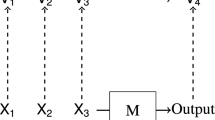Abstract
Since Kenneth Arrow showed the general possibility theorem, a number of social choice theorists have provided alternative proofs of it. In a recent article, Geanakoplos (Econ Theory 26:211–215, 2005) has constructed a new proof of the theorem. The present article provides alternative proofs of various Arrovian impossibility results from the 1960s to the 1970s by utilizing Geanakoplos’s method. We prove semi-order impossibility theorems, the quasi-transitive veto theorem, the quasi-transitive dictatorship theorem, the triple acyclic veto theorem, and the impossibility theorem without the Pareto principle.
Similar content being viewed by others
References
Arrow KJ (1950) A difficulty in the concept of social welfare. J Polit Econ 58: 328–346
Arrow KJ (1951) Social choice and individual values. Wiley, New York
Arrow KJ (1963) Social choice and individual values, 2nd edn. Wiley, New York
Banks JS (1995) Acyclic social choice from finite sets. Soc Choice Welfare 12: 293–310
Barberá S (1983) Pivotal voters: a new proof of Arrow’s theorem. Econ Lett 6: 13–16
Benoît JP (2000) The Gibbard–Satterthwaite theorem: a simple proof. Econ Lett 69: 319–322
Binmore K (1976) Social choice and parties. Rev Econ Stud 43: 459–464
Blackorby C, Donaldson D, Weymark J (1984) Social choice with interpersonal utility comparisons: a diagrammatic introduction. Int Econ Rev 25: 327–356
Blair DH, Pollak RA (1979) Collective rationality and dictatorship: the scope of the arrow theorem. J Econ Theory 21: 86–194
Blair DH, Bordes G, Kelly JS et al (1976) Impossibility theorems without collective rationality. J Econ Theory 13: 361–379
Blau JH (1959) Aggregation of preferences. Econometrica 27: 283
Blau JH (1972) A direct proof of Arrow’s theorem. Econometrica 40: 61–67
Blau JH (1979) Semiorders and collective choice. J Econ Theory 21: 195–206
Blau JH, Deb R (1977) Social decision functions and the veto. Econometrica 45: 871–879
Bossert W, Suzumura K (2009) Decisive coallitions and coherence properties. Discussion Paper, Université de Montréal, CIREQ
Bordes G, Salles M (1978) Sur l’impossibilite des fonctions de decision collective: un commentaire et un resultat. Rev Econ Polit 88: 442–448
Brown DJ (1975a) Aggregation of preferences. Q J Econ 89: 456–469
Brown DJ (1975b) Collective rationality. Cowles Foundation Discussion Paper 393
Campbell DE, Kelly JS (1993) t or 1−t. that is the trade-off. Econometrica 61: 1355–1365
Dardanoni V (2001) A pedagogical proof of Arrow’s impossibility theorem. Soc Choice Welf 18: 107–112
Denicolò V (1996) An elementary proof of Arrow’s impossibility theorem. Jpn Econ Rev 47: 432–435
Denicolò V (2001) An elementary proof of Arrow’s impossibility theorem: correction. Jpn Econ Rev 52: 134–135
Eliaz K (2004) Social aggregators. Soc Choice Welf 22: 317–330
Feldman A, Serrano R (2006) Welfare economics and social choice theory, 2nd edn. Springer, Berlin
Fishburn PC (1970) Arrow’s impossibility theorem: concise proof and infinite voters. J Econ Theory 2: 103–106
Fountain J, Suzumura K (1982) Collective choice rules without the Pareto principle. Int Econ Rev 23: 299–308
Geanakoplos J (2005) Three brief proofs of Arrowns impossibility theorem. Econ Theory 26: 211–215
Gibbard A (1969) Social choice and the Arrow condition, unpublished paper
Guha A (1972) Neutrality, monotonicity, and the right of veto. Econometrica 40: 821–826
Hansson B (1976) The existence of group preference functions. Public Choice 28: 89–98
Kirman AP, Sondermann D (1972) Arrow’s theorem, many agents, and invisible dictators. J Econ Theory 5: 267–277
Malawski M, Zhou L (1994) A note on social choice theory without the Pareto principle. Soc Choice Welf 11: 103–107
Mas-Colell A, Sonnenschein H (1972) General possibility theorems for group decisions. Rev Econ Stud 39: 185–192
Miller MK (2009) Social choice theory without Pareto: the pivotal voter approach. Math Soc Sci 58: 251–255
Murakami Y (1968) Logic and social choice. Routledge & Kegan Paul PLC, London
Richter MK, Wong KC (2008) Preference densities and social choices. Econ Theory 36: 225–238
Reny PJ (2001) Arrow’s theorem and the Gibbard-Satterthwaite theorem: a unified approach. Econ Lett 70: 99–105
Sen AK (1969) Quasi-transitivity, rational choice and collective decisions. Rev Econ Stud 36: 381–393
Sen AK (1970) Collective choice and social welfare. Holden-Day, San Francisco
Sen AK (1977) Social choice theory: a re-examination. Econometrica 45: 53–89
Sen AK (1979) Personal utilities and public judgements: or what’s wrong with welfare economics?. Econ J 89: 537–558
Sen AK (1995) Rationality and social choice. Am Econ Rev 85: 1–24
Suzumura K (2000) Welfare economics beyond welfarist-consequentialism. Jpn Econ Rev 51: 1–32
Ubeda L (2003) Neutrality in arrow and other impossibility theorems. Econ Theory 23: 195–204
Wilson R (1972) Social choice theory without the Pareto principle. J Econ Theory 5: 478–486
Wilson R (1975) On the theory of aggregation. J Econ Theory 10: 89–99
Author information
Authors and Affiliations
Corresponding author
Rights and permissions
About this article
Cite this article
Cato, S. Brief proofs of Arrovian impossibility theorems. Soc Choice Welf 35, 267–284 (2010). https://doi.org/10.1007/s00355-010-0440-2
Received:
Accepted:
Published:
Issue Date:
DOI: https://doi.org/10.1007/s00355-010-0440-2




